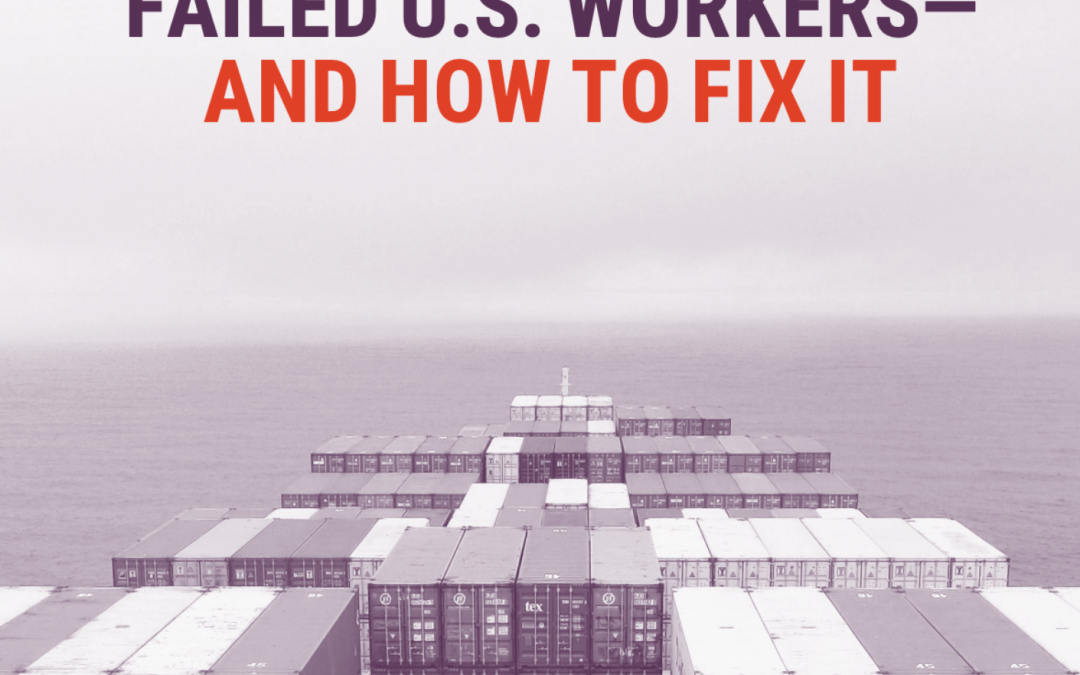Over the last several decades, U.S. trade policies have failed most Americans. Under the guise of “free trade” special interests have captured trade policy to extract wealth at home and abroad and leave working people to bear the costs. Coupled with the myriad of domestic policy failures that have left workers, families and communities worse off, U.S. trade policy made Americans more vulnerable to the COVID-19 crisis, in terms of both their jobs and their health. Despite the U.S. having the world’s largest economy, many households are struggling to survive. Its hollowed-out manufacturing sector cannot produce the essential virus protection equipment and components that U.S. workers and households desperately need. The combined impacts of failed trade policy and the botched handling of the pandemic have also compounded inequality, with women, Blacks and other communities of color disproportionately suffering the loss of jobs.
In 2016 Donald Trump campaigned on a promise to change the course of U.S. trade policy. But his counterproductive tariff wars have made things worse. Even before the pandemic, former manufacturing centers of the Midwest were experiencing slower job growth under Trump than under the Obama administration. His signature initiatives — the renegotiation of the North American Free Trade Agreement (NAFTA) and his trade war with China — have failed to produce good jobs. The official U.S. government projection of the impact of the revised NAFTA (now called the USMexico- Canada Agreement or USMCA) projects a loss to the U.S. economy and fewer jobs as a result of the agreement, unless one accepts dubious propositions about the value of its pro-corporate deregulatory measures. The trade war with China led to higher costs for consumers and losses to farmers cut off from that key market. For manufacturing sectors, any positive effects from Trump’s tariffs were more than offset by the rising cost of inputs and negative effects from retaliatory tariffs imposed by trading partner countries who fight tit-for-tat when targeted. The only winners of the Trump trade policy? Big pharma, big finance and big tech.
To distract Americans from his failed policies and failed handling of the current economic and health disaster, President Trump blames China—for everything. And yet despite his anti-China rhetoric, foreign direct investment by U.S. corporations into China has continued at high levels throughout his presidency. In 2019, for example, U.S. firms invested $14.13 billion in China—more than in 2016, the year he was elected—led by construction of new auto plants there by Tesla and General Motors. The fact is that China continues to invest in infrastructure and manufacturing and as a result attracts investment from across the world. Meanwhile Trump showered tax breaks on the rich instead of investing in America’s jobs and crumbling infrastructure.
Judging by the trade deficit—the measure of U.S. trade performance preferred by Trump—he has clearly failed. There has been a larger trade deficit in each of the three full years of his presidency than there was when he took office from Obama.
In this time of crisis, we need a new trade policy more than ever to support an economic recovery from the pandemic and to start building an equitable economy that is resilient to future crises. A new policy must shift bargaining power away from corporations and towards working people to create an economy that works for everyone, not just special interests.
This new policy should emphasize international cooperation—rather than antagonistic tariff wars—to encourage policies that lift up working families around the world, stabilize the global economy and provide a global order that protects public health, addresses climate change and builds a green economy now and for future generations.
by Sandra Polaski | Sarah Anderson | John Cavanagh | Kevin Gallagher | Manuel Pérez-Rocha | Rebecca Ray.


Recent Comments